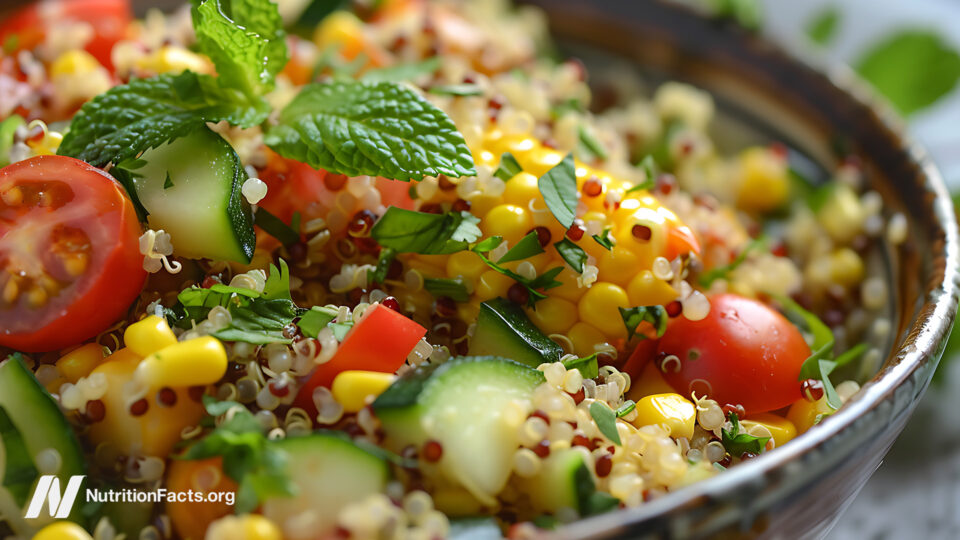Plant-based diets can be 98 percent effective in keeping ulcerative colitis patients in remission, far exceeding the efficacy of other treatments.
“One of the most common questions physicians treating patients with IBD [inflammatory bowel disease] are asked is whether changing diet could positively affect the course of their disease.” Traditionally, we had to respond that we didn’t know. That may now be changing, given the “evidence in the literature that hydrogen sulfide may play a role in UC,” ulcerative colitis. And, since the sulfur-containing amino acids concentrated in meat cause an increase in colonic levels of this rotten egg gas, perhaps we should “take off the meat.” Indeed, animal protein isn’t associated only with an increased risk of getting inflammatory bowel disease in the first place, but also IBD relapses once you have the disease.
This is a recent development. “Because the concept of IBD as a lifestyle disease mediated mainly by a westernized diet is not widely appreciated, an analysis of diet in the follow-up period [after diagnosis] in relation to a relapse of IBD has been ignored”—but no longer. Ulcerative colitis patients in remission and their diets were followed for a year to see which foods were linked to the return of their bloody diarrhea. Researchers found that the “strongest relationship between a dietary factor and an increased risk of relapse observed in this study was for a high intake of meat,” as I discuss in my video The Best Diet for Ulcerative Colitis Treatment.
What if people lower their intake of sulfur-containing amino acids by decreasing their consumption of animal products? Researchers tried this on four ulcerative colitis patients, and without any change in their medications, the patients experienced about a fourfold improvement in their loose stools. In fact, they felt so much better that the researchers didn’t think it was ethical to try switching the patients back to their typical diets. “Sulfur-containing amino acids are the primary source of dietary sulfur,” so a “low-sulfur” diet essentially means “a shift from a more traditional western diet (high in animal protein and fat, and low in fiber) to more of a plant-based diet (high in fiber, lower in animal protein and fat).” “Altogether, westernized diets are pro-inflammatory, and PBD [plant-based diets] are anti-inflammatory.”
What can treatment with a plant-based diet do after the onset of ulcerative colitis during a low-carbohydrate weight-loss diet? A 36-year-old man lost 13 pounds on a low-carb diet, but he also lost his health; he was diagnosed with ulcerative colitis. When he was put on a diet centered around whole plant foods, his symptoms resolved without medication. He achieved remission. That was just one case, though. Case reports are akin to glorified anecdotes. The value of case reports lies in their ability to inspire researchers to put them to the test, and that’s exactly what they did.
Until then, there had never been a study published that focused on using plant-based diets for treating ulcerative colitis. Wrote the researchers, a group of Japanese gastroenterologists, “We consider that the lack of a suitable diet is the biggest issue faced in the current treatment of IBD. We regard IBD as a lifestyle disease caused mainly by our omnivorous (Western) diet. We have been providing a plant-based diet (PBD) to all patients with IBD” for more than a decade and have published extraordinary results, far better than have been reported elsewhere in the medical literature to date. (I profiled some of their early work in one of the first videos that went up on NutritionFacts.org.) The researchers found a plant-based diet to be “effective in the maintenance of remission” in Crohn’s disease by 100 percent at one year and 90 percent at two years. What about a plant-based diet for relapse prevention in ulcerative colitis?
“Educational hospitalization” involved bringing patients into the hospital to control their diet and educate them about the benefits of plant-based eating (so they’d be more motivated to continue it at home). “Most patients (77%) experienced some improvement, such as disappearance or decrease of bloody stool during hospitalization.” Fantastic!
Here’s the really exciting part. The researchers then followed the patients for five years, and 81 percent of them remained in remission for the entire five years, and 98 percent kept the disease at bay for at least one year. That blows away other treatments. Those relapse rates are far lower than those reported with medication. Under conventional treatment, other studies found that about half of the individuals relapse, compared to only 2 percent of those taught to eat healthier.
“A PBD was previously shown to be effective in both the active and quiescent stages of Crohn’s disease. The current study showed that a PBD is effective in both the active and quiescent stages of UC as well.” So, the researchers did another study on even more severely affected cases with active disease and found the same results, with plant-based eating beating conventional drug therapy by far. People felt so much better that they were still eating more plant-based food even six years later. The researchers conclude that a plant-based diet is effective for treating ulcerative colitis to prevent a relapse.
Why? Well, plant-based diets are rich in fiber, which feeds our good gut bugs. “This observation might partly explain why a PBD prevents a variety of chronic diseases. Indeed, the same explanation applies to IBD, indicating that replacing an omnivorous diet with a PBD in IBD is the right approach.”
It’s like using plant-based diets to treat the cause of heart disease, our number one killer. Plant-based eating isn’t only safer and cheaper, but it also works better with no noted adverse side effects. Let’s compare that to the laundry list of side effects of immunosuppressants used for ulcerative colitis, like cyclosporine, which you can see below and at 5:40 in my video.

We now have even fancier drugs costing about $60,000 a year, about $5,000 a month, and they don’t even work very well; clinical remission at one year is only about 17 to 34 percent. And, instead of no adverse side effects, the drugs can give us a stroke, give us heart failure, and can even give us cancer, including a rare type of cancer that often results in death. Also, a serious brain disease known as progressive multifocal leukoencephalopathy, which can kill us, and for which there is no known treatment or cure. One drug lists an “increased risk of death” but touts that it’s just “a small pill” in an “easy-to-open bottle.” I’d skip the pills (and their potential side effects) and stick with plant-based eating.
Doctor’s Note:
If you missed the previous video, see Preventing Inflammatory Bowel Disease with Diet and stay tuned for The Best Diet for Crohn’s Disease Treatment, coming up next.
Check the related posts below for some older videos on IBD that may be of interest to you.

